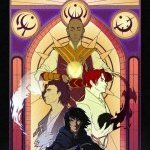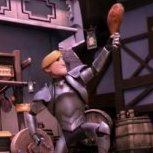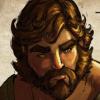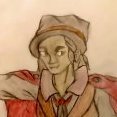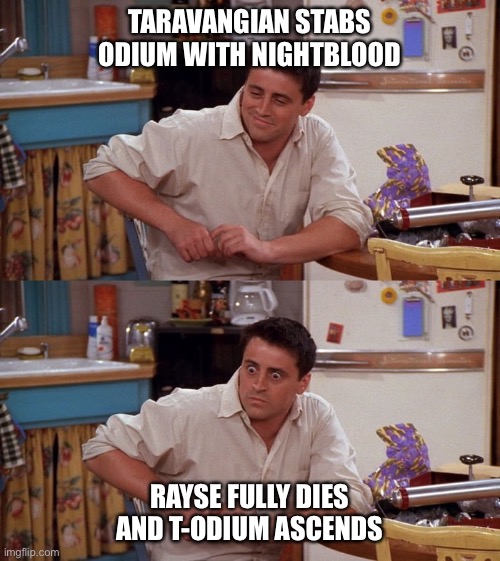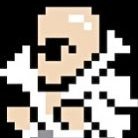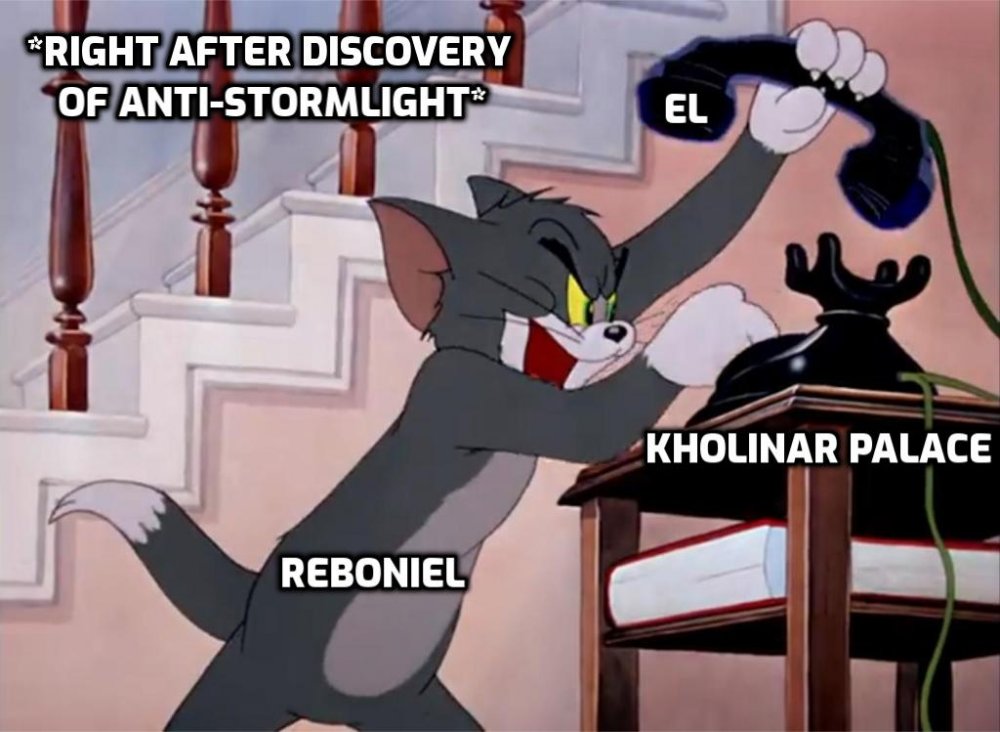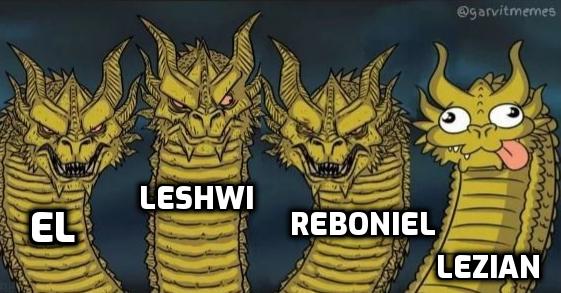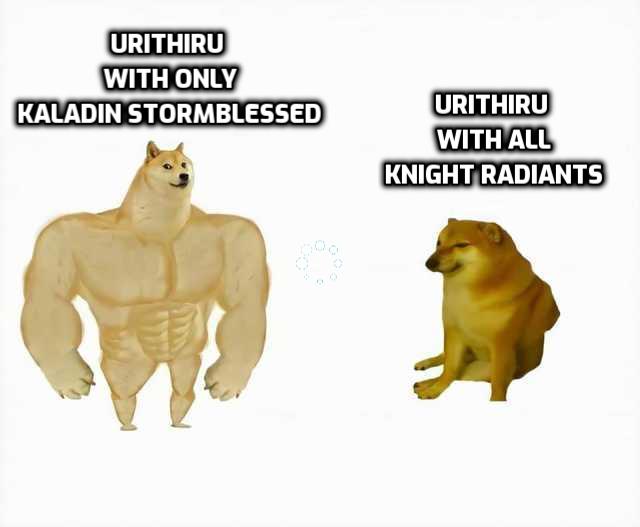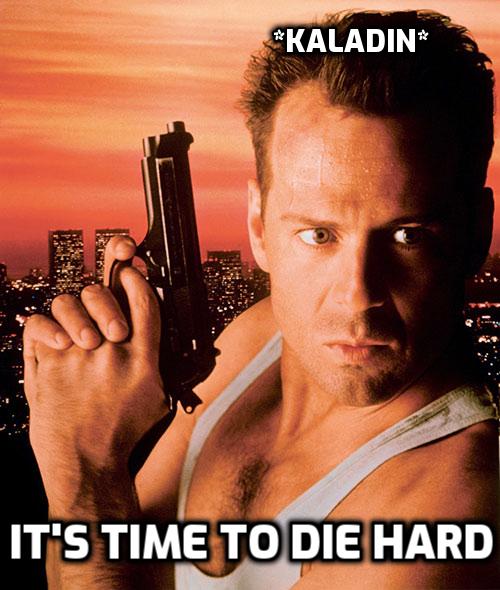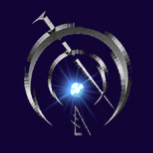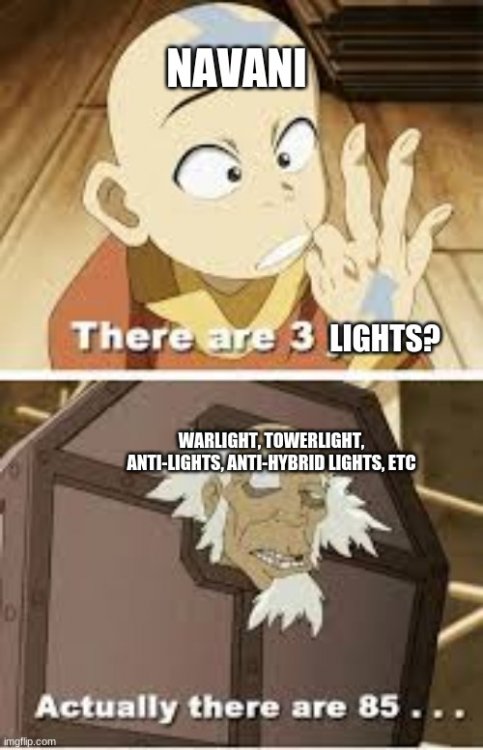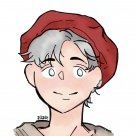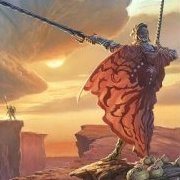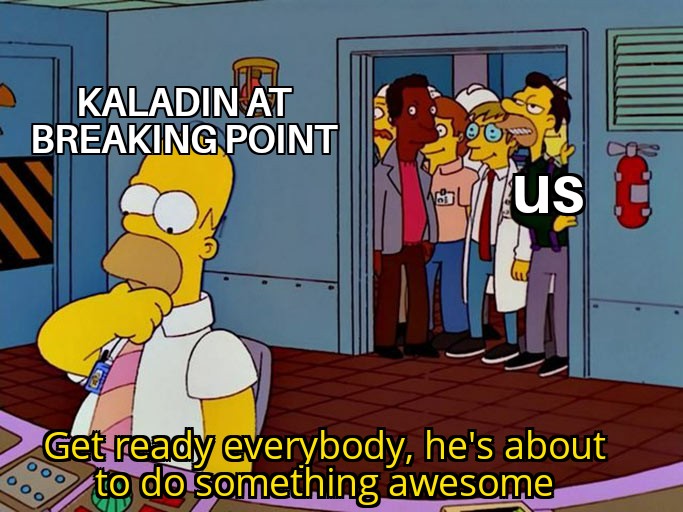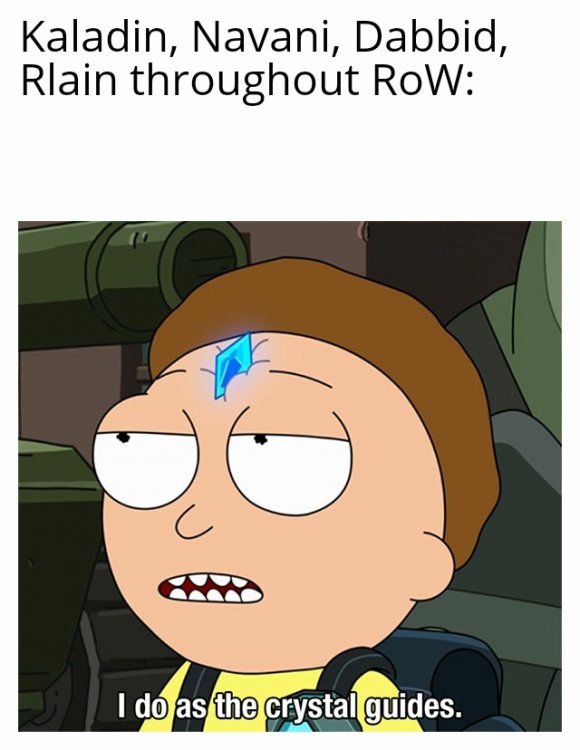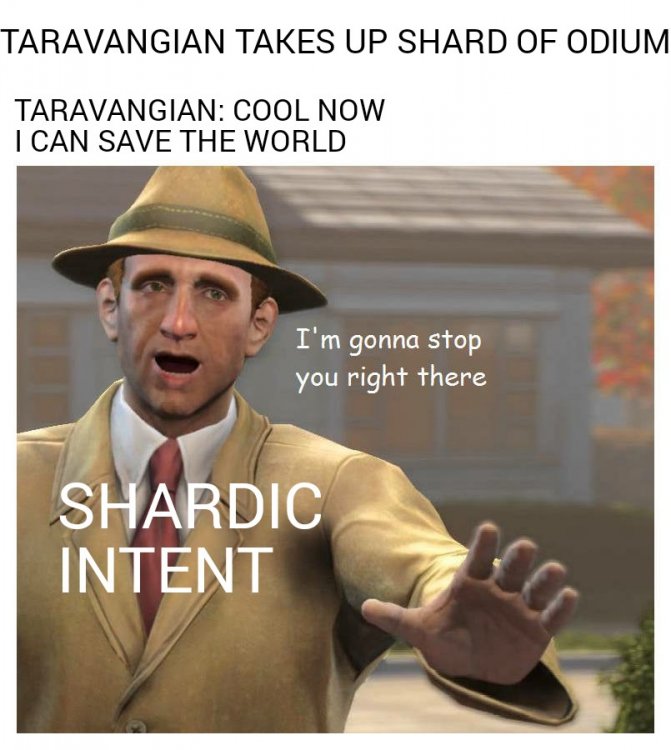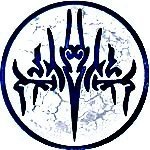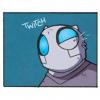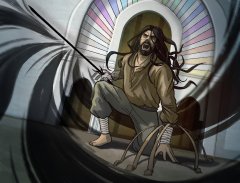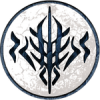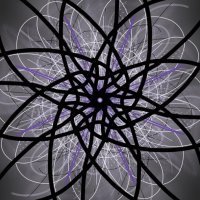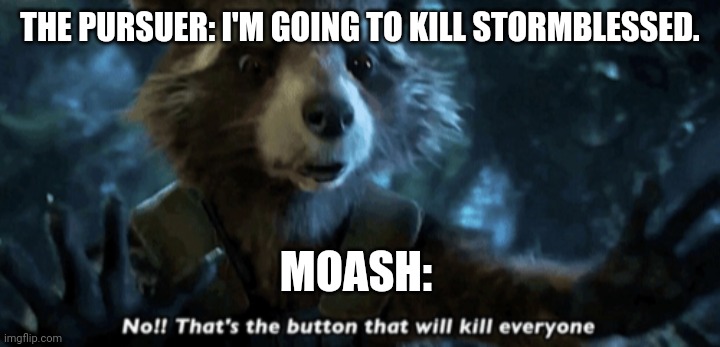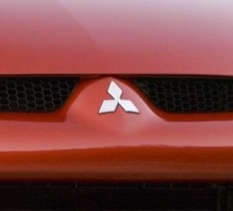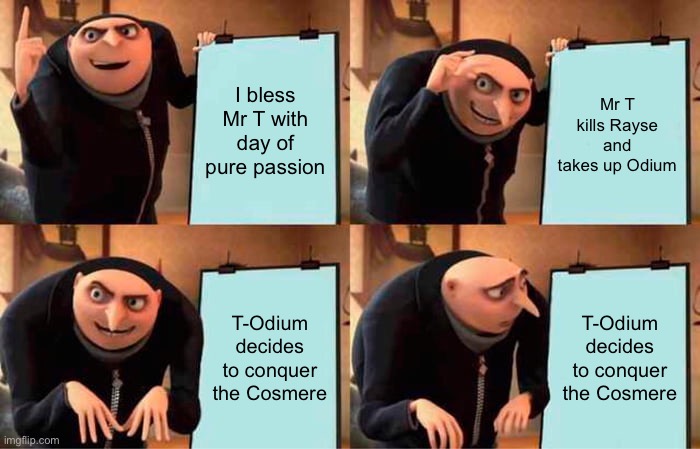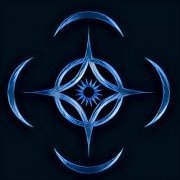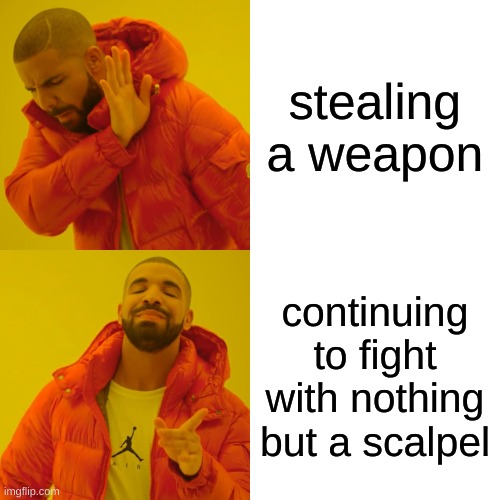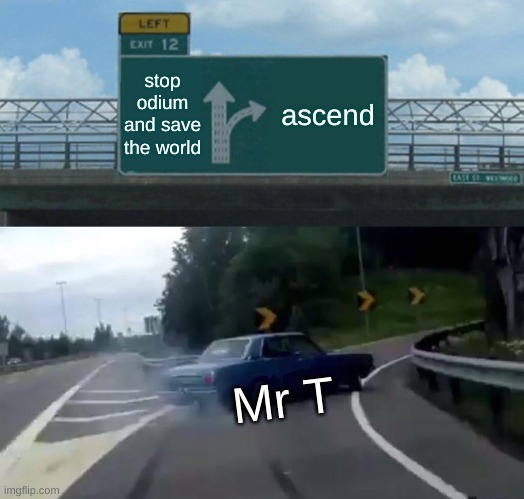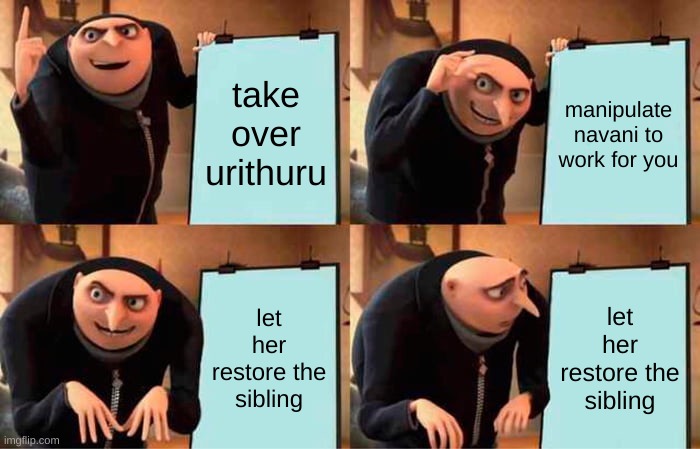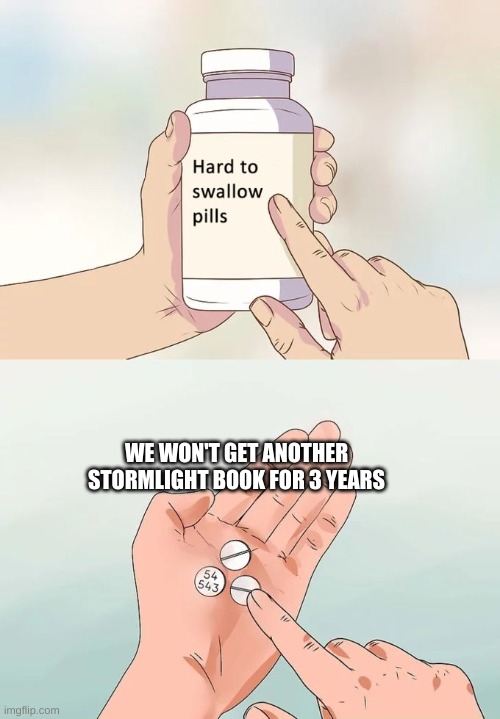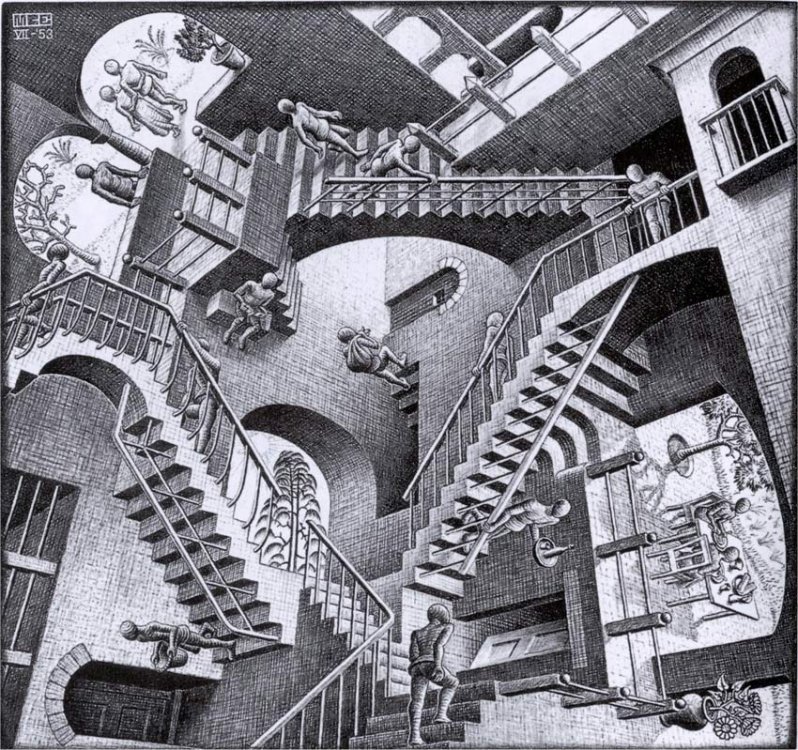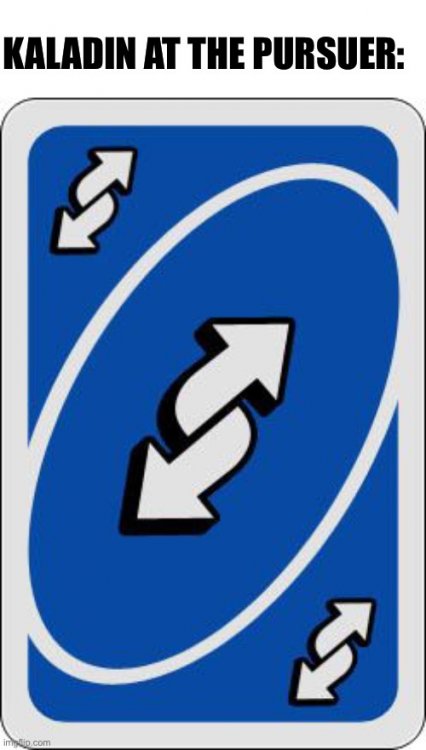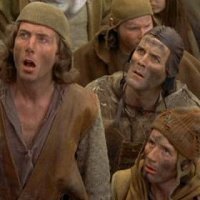Leaderboard
Popular Content
Showing most liked content on 11/28/20 in all areas
-
Guys, guys, I just realized something. What happens at the climax of Edgedancer? Lift reaches her next Ideal and Nale is forced to admit he's been kind of crazypants. In other words, a Radiant swears an Oath and the Herald in her vicinity has a moment of lucidity! Sneaky Brandon, slipping that bit of foreshadowing right past us.8 likes
-
I, like many others I think, came away from my first reading of the RoW epilogue with a sense of dread: Hoid, our confident, seemingly untouchable Cosmere guru had just been bested. While we've never really been privy to Hoid's true motivations, we've always just sort of trusted him--especially due to his more proactive nature in Stormlight, where he often gives our main characters the wisdom (and compassion) they need exactly when they need it. Seeing Odium mess with Hoid's Breaths/memories was genuinely scary. However, after a couple days to ruminate and giving the epilogue a reread, I'm beginning to come around more to the idea that Wit might have actually outmaneuvered Odium in the end. The whole monologue Wit gives before the confrontation is about the dirty tricks of storytelling: how the audience is actively engaging in a shared lie with the storyteller, which enables the storyteller to "make [the audience] know the truths that [the storyteller has] made up." While at first I took this to mean that Wit was talking about himself as "the storyteller," I think in retrospect within this scene Taravangian/Odium is the storyteller and Wit is the willing audience. Why is this distinction important? Because of what Wit later tells Design: When Wit says that his first meeting with Odium in over a thousand years had gone "exactly as he imagined," he's not referring to Odium acting like a pompous evil prick; rather, he's referring to the fact that Wit knew Odium was going to lie to him in some capacity. And so, brilliant as ever, Wit actively went into the confrontation as a willing audience ready to accept whatever lie Odium, the storyteller, was going to present. When Wit leaves, after the redo of their conversation following Odium's Men-in-Black memory erase flash, he first feels like something is wrong before telling himself: "Don't trouble yourself. This is working." Wit is the audience walking away from the story, with Odium's performance lingering in his mind. He knows he can rip it apart, and figure out how it was done--discover the flaws, signs, and secrets. Wit might not know precisely in that moment what those secrets are--but he knows he has enough information to puzzle them out, and I'm confident he will be able to do so. With this in mind, I think it's fair to assume the memories held in his Breaths were willingly offered up as a sacrifice to play out Wit's role as a willing audience to Odium's lie. Wit knows Odium can't hurt him directly due to the agreement Dalinar just made, but I find it doubtful Wit wouldn't have imagined Odium would take any shots he could at Wit within the consigns of that agreement. Wit knowingly exposes himself to Odium (before both conversations, the text says Wit "made himself available--visible, easy to reach," probably meaning Wit is turning off whatever he does to hide himself from Shards). He's smart enough to know the risks, and while the lost memories and Breaths will probably be missed--I think Wit must have felt their loss would be worth whatever information he would gain by confronting Odium directly.7 likes
-
She chose to break the oaths, including the first oath. The easiest way to break the oaths is to just decide to. Like when in Dalinar's vision of the recreance, when all of the radiants broke their oaths and gave up their plate and blades, they didn't really do anything. They just decided they weren't going to live by the first oath ("Life before death, Strength before weakness, Journey before destination") and that broke the bonds and killed the spren. Shallan shows us the moment where she killed Testament.6 likes
-
Two things One: I’m a high prince! I call being Ruthar. . . Shoot. Never mind. Two: I set up the mini Christmas tree in my room, here it is!:5 likes
-
@I Am A Fish do you feel special? 'Cuz I feel special.5 likes
-
I can tell you such people exist... because my maternal grandfather was one of them. He was a teenager when his family was deported by the Nazis from Czechoslovakia. He survived the entire beside his brother, only for his brother to die of diabetic shock when the Well-meaning soldiers shared their rations. He carried his brother’s body from the Russian side to the American side, so he could live free. He discovered his father survived, but was trapped behind the Iron Curtain. We’ve never found out what happened to him. He got his two sisters married off before getting married himself. He built himself up from nothing to become wealthy. He struggled for 20 years to have a child. And everyone I’ve ever met who knew says he was the kindest, gentlest, joyous, most giving person they knew. So people like this? They exist.5 likes
-
5 likes
-
Just a thought I've had about Cultivation's plan re: preparing Taravangian to take up the Shard of Odium. Cultivation has held her Shard for thousands of years at this point, so I think it's safe to assume at this point that the Intent of the Shard restricts her ability to act with her power in ways that contradict that Intent. When Vin took up Preservation, she was so new that she could use the power of Preservation to attack Ruin more directly--she hadn't been molded by the Intent of the Shard quite yet. But Cultivation does not have this liberty--she can only Cultivate, and this seems pretty counter to her being able to Splinter Odium once Rayse was killed. Knowing this, I believe her only option was to Cultivate someone who could replace Rayse as Vessel to Odium. Her touch on Taravangian was exactly this--she says as much at the end of RoW when she greets Taravangian as he ascends. We still don't know her true motives or endgame, but I've got to say I'm impressed with her ability to work within the confines of her Intent to counter Odium (even if, in doing so, she's created a bigger monster).4 likes
-
I just started writing my first thing. Like, it's the first time I've ever wrote something on my own. I got the idea from @Ookla the Yay's The Girl Who Looked Up, and I am writing the extended version of Fleet. It's tough, but I will try and post it sometime in the next week. Thanks Y'all!4 likes
-
4 likes
-
4 likes
-
Fascinating. I can see that happening in book 5 for sure and several WoBs have stated that: Shards are power of Adonalsium i.e Powers of creation. They are same energy which a particular universe is built on and if they are energy, then we know it cannot be ever destroyed...only transferred. Shards, if splintered, cannot be actually destroyed. WoBs can confirm it. We know that Hoid's plan are to assemble something together but that's not Adonalsium probably since scholars of cosmere argued it would be dangerous, the intent began as a useless purpose. Whatever Hoid's plan are....let's keep them aside. We know that destroyed Shards can be reforged or combined together to form themselves again or a brand new dishard like Harmony. In Mistborn Era 1, we saw destruction of Ruin and Preservation but they their 'essence' was combined to form Harmony. It means Shards might get splintered but the energy within cannot be destroyed every. The followed letters from RoW confirm it which I had mentioned in a separate threat. Honor is not dead. His vessel is destroyed- his holding confinement as a Shard is gone but his essence, his energy is still influential in Rosharan system. Tanavast, the vessel is dead but Honor isn't hence he can be reforged. We all are directing our eyes at Dalinar to ascend and take this Shard but I don't believe that'd be the case. He might fail and someone has to take its place...someone who's bonded to an ancient, secretive and highly coveted Honorspren and is perhaps the most honorable man alive in Roshar currently.4 likes
-
Knights of Wind would be a nice title as well, giving a nod to Kaladin and Szeth's mission to Shinovar as well as Skybreakers/Windrunners.4 likes
-
4 likes
-
From the album: Stormlight Archive Art (Mostly)
So one of my brothers is on a two year mission for my Church and we were just getting his Christmas box ready to send out (because reasons), and another brother suggested that I put women's script on the box to mess with him since he cannot look up the script for reference, lol. So, have fun with that, lol.3 likes -
I’ve seen this opinion a lot, and I appreciate that it’s a common one in the fandom. My favorite Adolin-hater friend will surely be along shortly to tell me all the ways I’m wrong, I’m sure. ;-) But I read him with more depth and nuance than many seem to, perhaps because his colors are in more muted shades than our main characters. There’s subtext, and fewer viewpoints, and we are often seeing him through the eyes of our (often struggling) main cast. We see him in Dalinar’s flashbacks as the perfect, eager son. We don’t see his feelings dealing with his mother’s death or his angry, alcoholic father. We see him in WoR via Shallan as a perfect Adonis with the perfect life. We see him via Kal’s eyes as the spoiled lordling with no sense of how the masses struggle. But in the moments we read his POVs, I read the insecurity and jealousy in them, almost from the beginning. Polishing Maya before his duels in WoR he talks about how little people expect of him and how hard it is to live in his fathers shadow, all while never letting himself resent Dalinar. His anger at Sadeas and his betrayal. His fear in Shadesmar and his emotions during the battle at Thaylan Fields. And he was downright resentful toward Dalinar in RoW—and set out to prove himself in a way that almost got himself imprisoned. And yet, yes, he is emotionally stable, and agreeable, and conscientious. But as I’ve said in other threads on this, I feel like still waters often run deep, and I read the Adolin chapters with more shades of gray than many do, apparently. Perhaps it’s because I’m used to the similar reactions from others, even close friends!, who think my life is perfect when it is decidedly not. As my fav Adolin-hating poster here said once, “Bliev, you’re projecting.” Perhaps. But we all read them through our own lenses. And I certainly identify. on topic, though, I don’t think we will see Adolin the radiant, because Adolin is a committed man, and Maya is his choice. And I’m not sure if she’d be able to bond again in that way, or if Adolin would ever push her to do so, even if she could.3 likes
-
Yeah, I was just going to say this. Nothing wrong with playing around with stuff in the public domain, but, especially with really well-known stuff like Lovecraft's work, it's really hard to cherry-pick; not an issue if you're setting out to write a Lovecraft-esque story, but if you're just looking to borrow one or two things it might be difficult to convince readers that it's not a Lovecraftian story, if that makes sense.3 likes
-
I think that the Skybreakers have a viable third option now. They can serve the Listeners. Apparently there are hundreds of Reachers who are willing to bond Listeners. Then you also have the awaken children of Ja Sa Nat (sorry for spelling). 4 fused, several Regals (who could also become Radiant in Regal form). So all that combined would make the Listeners strong enough that no one would want to fight them.3 likes
-
I agree, and recently posted a similar theory of my own. We know that investment in a system will make it harder for a Shard to leave a system. I think Cultivation's endgame might very well be to have either a hidden Tanavast shadow (as I think the Stormfather, who is a Sliver of Honor and highly, is used as decoy by Cultivation to keep Odium from discovering the Cognitive Shadow of the Tanavast the Vessel) take up the Odium shard (and become War) - or to manipulate Odium into leaving Roshar, so she can regrow a new body for Tanavast. If Odium is tethered to Roshar through investiture, he should be able to gain freedom by destroying those invested - that would mean wiping out the Fused and the Unmade. This WoB has some interesting stuff about investiture and Shards - and how investiture isn't simply energy from a particular shard and 'flavored' by it. The reason I have so much trouble answering these questions (and you'll see me struggling to get an answer in the 10-15 seconds I have when someone asks me in a signing line) is because this isn't an either or. Is this computer I'm using matter associated with Earth, the Big Bang, or such-and-such star that went supernova long ago? Well, it's probably all three. When people ask, "What Shard is this Investiture associated with" it gets very complicated. Shards influence and tweak certain Investiture, giving it a kind of spin or magnetism, but all Investiture ever predates the Shattering--and in the cosmere matter, energy, and Investiture are one thing. I always imagine Investiture having certain states, certain magnetisms if you will, associated with certain aspects of Adonalsium. So it's all "assigned" to a Shard--because it's always been associated with that Shard. To Investiture, Adonalsium's Shattering meant everything and nothing at the same time. We generally mean the term "Invested" to mean a Shard has taken permanent residence in a location, a kind of base of operations--but at the same time, this is meaningless, since distance has no meaning on the Spiritual Realm, where most Shards are. So imprisonment of a Shard like Ruin or Odium is a crude expression--but the best we have. Autonomy never "Invested" on First of the Sun. But even answering (as someone else asked) if they created an avatar without visiting is a difficult thing to explain--because even explaining how a Shard travels (when motion is irrelevant) is difficult to manage. It's a subject that I intend to be up for debate, discussion, and argument by in-world philosophers and arcanists. You can see why I have such troubles explaining these things at signings--and why I fail when I try to, considering the time limitations and (often) fatigue limitations placed upon me. These are concepts I intend to spend entire, lengthy epic volumes explaining and exploring. Let's say you were Autonomy, and you have--through expanding and exploring your understanding--found a gathering of Investiture that has always been there, you always knew about, but still didn't actually recognize until the moment you considered and explored it. (Because even though your power is infinite, accessing and using that infinity is beyond your reach.) Were you "Invested" there? No, no more than you're Invested on Roshar, where parts of what were Adonalsium still exist that are associated with you (in the very fabric of mater and existence.) But suddenly, you have a chance to tweak, influence, and do things that were always possible, but which you never could do because you knew, but didn't know, at the same time. And...I'm already into WAY more than I want to be typing this out right now. If it's confusing, it's because it's practically impossible for me to explain these things in a short span of time. I'm going to leave it here, understanding that no, I haven't fully explained your question. (I didn't even get into what avatars are, what Patji was, and what happened to Patji the being--and how that relates to Patji the island.) But hopefully this kind of starts to point the right direction, though I probably should have just left this question alone because I bet this post is going to raise more questions than it answers... General Reddit 2018 (March 18, 2018) To me this indicates that Odium could be using investiture in different way than other Shards. Considering his intent - it seems possible that he interacts with investiture by "super-charging"/"polarizing" existing investiture, rather than how other Shards seem to manipulate their own investiture and build a system on it. Odium doesn't have a system - he just breaks that of other Shards. I don't think it's a coincidence that the Shards he splintered in other systems don't exist in an "Odium-corrupted" state. I think by interacting with investiture he ties himself to a system. I might speculate his modus operandi is to corrupt during the fight, then once victory is achieved, he destroys whatever he touched, and moves on. The cycle of desolations on Roshar, and his failure to achieve victory, may have prolonged this for so long that the investiture he's corrupted has gained more power and agency than he expected or wanted. His splinters and minions essentially repeating his behavior on a smaller scale (BAM, Raboniel, Sja-Anat). He does seem to have a preference for freshly corrupted minions. Perhaps to avoid a cascade of investment that is trouble to clean up afterwards. Consider Odium heading into Roshar to wreck Honor (and maybe Cultivation - he seems to care less about her) - he'd want to splinter Honor and then move on. If Honor lives in the hearts of men then he wouldn't want to exterminate all humans on Roshar as that might un-splinter Honor. He doesn't want to permanently corrupt everything, as that would tie him to Roshar. I think his endgame is to exterminate the Singers and Fused once he tricks/browbeats a child/champion of Honor into releasing him from Roshar. TL;DR - I think being 'marked' / corrupted / invested by Odium is a death-sentence, since he wants clean up any such ties to a system before moving on.3 likes
-
These discussions are the reasons I love this community!! So, characters like Kaladin, Dalinar, Shallan...all fight against odds, and then learn to live normally!!! And that is so charismatic that we all can't ignore them. That is their character growth!! Learning to live normally!! What to do with a character who already does live normally?? Who has sorted out issues, so, doesn't have to go through such arcs? I didn't mean to say, best of them all in the sense of, he is better than all of them as a character. I just meant, he is the most stable person.. the one, who is most balanced emotionally, and who does not need to go through such difficult times.. It is so easy to discount these people, because what's so special about them? They can handle themselves. So why to worry? Doesn't that make them atleast noticeable that they are special because they are normal? When weird becomes normal, doesn't normal become weird? That Adolin can remain who he is despite everything going around him, and not go into bouts of jealousy, or depression, or vengeance.. ya.. for me, that makes him special...3 likes
-
Some thoughts that I'd like to share (also posted to Goodreads, in the form of a review): ★★★★☆ (3.5/5, rounded up to 4). The adventure continues! I enjoyed Rhythm of War (RoW), though I found it to be the weakest book of the Stormlight Archive (SA) series thus far. While it flowed more smoothly than its immediate predecessor, Oathbringer, it also lacked, for me, some of the emotional moments, excitement, twists, and character development that characterized the first three books. There was one exception, however: the plot twist concerning Taravangian. I absolutely cannot wait to see what he will do as Odium! On the whole, this book felt like a slow-motion set up for the completion of the first arc of the story, the battle of champions. Below, I’ll sketch out what I thought were the pros and cons of the book. As with the rest of the SA, RoW shines in how it portrays moral lessons, personal growth, and mental health. This is a major advantage the series has over many other fantasy series, because it not only makes one want to live in its world, but makes you want to be a better person in our world. I think this is the heart of the story, very succinctly put by Rlain who said “then start doing better...that is the path of Radiance.” in response to Venli who said “I don’t deserve any of this…I was weak” (page 1189). I love the growth experienced by Venli, Rlain (who finally got the role he deserved), and Kaladin, and although Kaladin can be too intensely depressing at times too, struggling with the inner darkness is a feeling all too many people are familiar with. It is cool he founded the study of therapy in Roshar. On the other hand, I did feel that Shallan and Dalinar were somewhat neglected in this book. Shallan’s growth felt not so much rushed as convenient and cursory, and her big reveal, killing her first spren, did not feel that heart wrenching. Furthermore, Shallan’s sidekicks seemed to vanish from the story after their initial plot point (searching for the spy) was fulfilled. Also, Shallan and Wit have been talking and plotting together this whole time, and that's all just off-screen? Moving her brothers? Quite some omissions. Jasnah’s growth was intriguing and I want a lot more of her in future books. She grew from being one of my least favorite main characters, because of her demeanor in The Way of Kings, to a complex and multilayered character in the past two books, because she showed more vulnerability and emotion, at least as much as was needed for her character to remain true to herself. I enjoyed learning about two unique aspects of her character: her propensity to over-intellectualize and sound academic about even personal feelings including family matters and friendships, and her sapiosexuality (Sanderson, on Reddit, wrote that he wrote her as a heteroromantic asexual). Thus, Jasnah joins some of the other characters—Kaladin, Dalinar, and Shallan—who are fleshed out and relatable to fans. I also want more Wit/Hoid now! Briefly coming to Renarin, he, like Jasnah, is intriguing, and needs more screen time, but I did not feel enough was given to the readers to speculate about his personality, so I’m looking forward to learning more about him when we come to his flashback book. Adolin and Navani stole the show in terms of character development, and I am glad to see the hitherto side Kholin characters get so much growth and screen time. I really love Adolin, and people like Adolin in my life, people who know how to inspire a room, bring good cheer, and help others get out of their heads. Some people do think that Adolin has not grown enough throughout the series, but I disagree. In his relations with Shallan, his father Dalinar, and with his sword, Maya, he has always tried to be better, for himself, and for others in his life. That Adolin is not as navel-gazing as others, and more optimistic, is a plus. Adolin is almost like the Samwise Gamgee of the series: by solidly supporting and encouraging the power-struck and destiny-laden heroes, he does a great service in supporting everyone else, and thus becomes a true hero himself. This was basically Navani’s book, although it was billed as Eshonai’s flashback book. I do not have much to say about her specifically, but I enjoyed her development, and appreciate her solid, firm, and practical personality, which I think is a good complement to the other members of her family. Her backstory, and how she met Gavilar and Dalinar, would be quite interesting. (Actually, we need to know a lot about Gavilar's past too.) The combination of Navani with Raboniel, them two working in tandem, was what added so much beauty and fun to the Navani arc. The relationship and tension between the two was beautiful, and I am very sad that Raboniel was killed off. She was the first singer character that I really felt that I got to know and care for, more so than even Venli or Eshonai. There were also some moments of breathtaking beauty including: Eshonai’s last scene, where she rode the winds toward eternity, certain descriptions of Shadesmar, and Godeke’s religious epiphany in Shadesmar showed that the human capacity for wonder and reverence cannot be confined to any one religion or ideology, or the failure of such. The Book of Endless Pages concept was cool. However, I do have many criticisms of the book, which led to my 3.5 rating. Firstly, the back-and-forth between Kaladin and the Pursuer was dragged out for too long, and was perhaps unnecessary for the furthering of the plot. It read like a rather simplistic hack and slash plot embedded within a larger, more important story. As such, it didn’t have a strong impact on me. This book could have been cut short 200 pages. And what was the point of Teft being unconscious the entire book? I felt that the impact of his death would have been much greater if he was somehow more active throughout the book. More Teft and Lift would have been welcome for much of the Kaladain arc. Secondly, other characters got short shifts. Based on my own impressions reading the books, as well as Brandon Sanderson’s own interviews and comments on forums such as Reddit, I sense that Sanderson feels a need to prune the story so that it doesn’t grow out of control in the mode of Wheel of Time or A Song of Ice and Fire. While this is reasonable, at times, characters are killed off or moved out of the story because of this imperative, and I find this to be a loss. It's ok to have multiple villains alive at once, like if Sadeas were kept alive. Or if we got more Rock and Sigzil, instead of them being moved to the margins or out of the story. The Mink also needed some more development. Thirdly, my biggest criticism is I believe that Sanderson finally created an overly complex magical system and world, and his exploration of it—the spren, spren mechanics, especially in relation to technology, the gemstones, the voidlight and anti-voidlight, and the many combinations and permutations of light—felt over the top and somewhat self-indulgent. I am aware that I may be in the minority of fans in feeling this, but I did appreciate Sanderson’s magical systems in Mistborn and Warbreaker, and initially in this series. Sanderson’s background in chemistry, and love of video game mechanics is quite evident. To some, such as myself, it felt like reading a textbook on the pseudo-science of Roshar. But to each their own: I suspect that if the flora, climate, and geography were given this treatment, I would be less critical, since those are subjects I enjoy. Nonetheless, I do think that Sanderson overbuilt and over-described some of the mechanics of the magical systems/aspects in this book, and that took away from the mystery of the world, the flow of the book, and the coherence of the magical system, since there are so many aspects of it, it is hard to generalize regarding the spren, surgebinding, etc. in a way that is possible with allomancy. There are too many actors and possibilities with the spren: what is up with Sja-Anat for example? How does that fit in? Where does surgebinding come from? At first, I assumed it was linked with Honor or Odium, but the book made clear that Honor and Odium’s orders worked within the surgebinding system. But if surgebinding is investiture, then how did it come to the Rosharian system? I feel like I know too much about how spren can make a ship fly, and too little about some of these other questions. This complexity blends into the Cosmere aspects of the book too. Having read Mistborn, I was able to grasp what was going on, but I wonder if it would all seem more confusing to readers who are not familiar with the Cosmere. I think I need a thorough reread of the other Cosmere works after this. This brings me to another point, and a critique I have of Sanderson’s writing and worldbuilding: I think that he does not expand to scale very well. His best-written works, in my view, ones that are detail-oriented in relation to a single space and the mechanics of world building and characterization therein: the Shattered Plains (two books of the series were located there), Luthadel in Mistborn, T'Telir in Warbreaker. When Sanderson scales up, making the series more “epic” so to say, in the tradition of Tolkien and Robert Jordan, I feel like I’m quickly jumping around from place to place without getting a feel of any place, and this feels choppy. This is related to my final criticism. RoW featured an entire arc containing a battle to liberate Emul. We know a couple of things about Emul: while it is subordinate to Azir, it is still an independent state home to the important city of Sesemalex Dar, which Kaladin saw in his visions in The Way of Kings. Emul has been at war with Tukar for 80 years, and it is ruled by a Prime, currently Vexil the Wise, who we met in Oathbringer. Despite this reasonably moderate level of detail (reasonable because Emul is not the main country in the story), we read an arc dealing with Emul without meeting any Emuli characters, including the Prime. We have almost no information about the culture, customs, or characteristics of Emul. Whatever brief political and military information we need is presented, cursory, through quick meetings with the Azir leadership. I understand the need not to get distracted by a 500 page digression, but perhaps some elements of Emul could have been written in during the arc set there. I loved the way we discovered the Reshi Isles and Shinovar through the interludes in previous books, and I would have at least wanted to get a brief view of what Emul is like. Jah Keved is even more troublesome for me. It is one of the most powerful kingdoms in Roshar, the homeland of Shallan. It is the homeland of Vorinisim (Valath). The horneaters are technically under the overlordship of Jah Keved. And it falls to Odium so easily? Indeed, the events that occurred in Jah Keved, even accounting for Taravangian’s plots there, happened in an entirely convenient and swift way. Political developments occurred in Jah Keved in such a cursory manner, that it was evident that certain things were just happening conveniently and inexplicably quickly in the background in the service of the plot. We hear many, in about two sentences, that many of the new leaders of Jah Keved were inclined toward Odium and that is all. Assuming the people of Jah Keved are as human as the people of Alethkar, you're bound to see more things happening there: local leaders who support and resist Taravangian, random people who claim the throne, people fighting Odium or leaders who ally with Odium, and so on. I'm sure there are a lot of ideas there right now about how things should pan out in Roshar, and that was just reduced to nothing. I don't want these supporting characters and countries to be reduced to minions who just exist to further the plot. I felt the same way with Amaram's arc in the last book, especially the Orc-like behavior of his soldiers: when you need a thousand baddies for the heroes to fight, here they are. Sure, in-book explanations were given, but I didn't fully buy them. At this point, I realized one thing I really missed from George R.R. Martin’s writing: even random, unknown, side characters, like a third cousin or a counselor, could become important players, because that’s realistic. When you have a family-based aristocratic system, like in Alethkar, it really does matter who your random heir is. Who replaced Sadeas? Some random nephew, but this information is treated as unimportant. You can’t kill off the entire ruling class of Jah Keved to merely fulfill the needs of the story without there emerging new actors with new desires and their own agendas, sort of how Ramsey Bolton emerged out of nowhere in the wake of the chaos engulfing the North after the machinations of Theon Greyjoy. In short, the complexity of politics is leveled, and its implications and possibilities take a back seat in favor of the main story with our main characters. Again, I understand why Sanderson took this route. Martin got bogged down writing out the political game of thrones that characterized his books, losing track of the larger plot point. Robert Jordan never finished his series, and his widow needed to hire Brandon Sanderson to wrap up The Wheel of Time. With all due respect to Sanderson, who I love as the best world builder author out there—Roshar is so lush and full of life and mechanics!—he is not a student of politics, history, or anthropology, definitely not like George R.R. Martin in. Again, I am aware I am biased here by my own background, interests, and career choices in what I look for, but the lack of historically-informed political complexity began to grate on me. Despite all this, I wish Sanderson could have written politics and other, non-Alethi cultures, more into his work. He has clearly thought a lot about political topics, and is a good planner. Alethkar is quite well developed. So, if anyone can do it, Sanderson could. The canvas on which the incredible complexity of spren and magic is built seems a bit sparse. However, despite these critiques, I am looking forward to continuing to read and enjoy the series. We are not even halfway through the projected 10 books, so a lot could change and be filled in. I sense a bit of falling away from the freshness of his first two SA books from Sanderson in writing multiple 1,000+ page volumes and this is being reflected in the present volume. But despite all this, I love being part of the community of fans, and the large and caring fandom, unraveling mysteries, and discussing the books and world together. And I have been deeply impacted by the characters and their struggles and growth over the past few years of my life.3 likes
-
This is great! I have done translations of this on my own, and what you have matches up really well with what I did. There are a few places where I translated it differently, though, and I'll put them here for you to take or ignore at your pleasure: For the Crystal Pillar Room: Above the stairway you translated it as "Stairway chamber", but I think it is actually "Stairwell chamber" On the dagger: You say "Raboniel calls the metal raysium and says there is not enough in this dagger to collect her soul or what of a Herald.". I think it is "Raboniel calls the metal raysium and says there is not enough in this dagger to collect her soul or that of a Herald." On the Light Experiments: You say "The rhythms cause patterns in the sand different for the different kinds of Light.". I think it should read "The rhythms cause patterns in the sand. Different patterns for the different kinds of Lights." As well, you say "Your research has yielded great fruits. There was a time I thought it possible for one...", but I think it reads "Your research has yielded great fruits. There was a time I thought it impossible for one.." I hope I was able to help you in any way, and appreciate the work you did compiling this post because, though I had the translations already, I would never have done something like this.3 likes
-
3 likes
-
This thread is to continue the discussion about the natures of the four Dawnshards, and which Shards might be associated with each, but with the addition of Invention, Whimsy, Mercy, and Valor. --- My current idea: Change - Cultivation, Ruin, Endowment, Preservation. I understand that including Preservation here seems backwards, but being adamantly against change is still being defined by your relationship to change. Bind or Restrain - Honor, Dominion (the binding of others), Devotion (the binding of the self), Autonomy (included here under the same rationale as including Preservation under CHANGE). Act - Odium (acting from hatred, passion, fury), Ambition (taking action to fulfill one's goals), Invention (acting on ideas), Whimsy (the freedom to act on caprice). The final set, I have a hard time summing up in a single verb, but I understand as sort of a philosophical opposite to ACT. What Odium, Ambition, Invention, and Whimsy have in common is that they are centered on the desires, feelings, and thoughts of the self, with a certain disregard for what effects your actions have on the world around you. These Shards all impose their own will on the world, exert control on the world. In contrast, the final set have in common a certain self-abnegation. Instead of being able to impose your own will on the world, these Shards are about what you do when you have no control over the world, how you behave when faced with bad circumstances. I am reminded of Jasnah's perspective on the word 'hope': a value you turn to when you lack options. Arguably irrational, yet still noble. With that in mind, I lean toward Accept, but React or Choose could also work. Valor - True valor only exists when you are scared, but stand firm anyway. You accept that circumstances are dire, and choose to disregard your own survival. Mercy - True mercy only exists when you could punish somebody, but stay your hand. You accept letting somebody "get off light", and instead choose forgiveness and compassion. Hypothetical Wisdom/Prudence/Understanding Shard - The better part of wisdom is setting aside wishful thinking and accepting the world as it is, choosing to face hard truths over comforting lies. Honestly, a Hope Shard could very well fit here, but who even knows. I actually see all four of these Commands as underpinned by a fundamental philosophical dichotomy: that of self vs other, or perhaps subject vs object. But that gets very nebulous (and long-winded) so I'll save it for another post, perhaps.2 likes
-
Did anyone else feel really betrayed after you found out that Pattern was the traitor. I know later it turned out that he was only trying to help Shallan, but when Shallan realized Pattern betrayed her, honestly thought that Pattern was actually a super evil double agent spy or something like that.2 likes
-
Cool cool, thanks for the feedback everyone, and good points. I guess it looks like I'm good to go then. I think the tone is compatible, and as I said its not a huge part of the plot, but the story is a pretty soft sci-fi/horror romp and I thought it might be cool to include2 likes
-
I honestly believed that Pattern was evil for a while there, and that made his dialogue shift for me. Suddenly all the wierd things he said felt more alien and scary, and not as funny or friendly as usual, which goes to show how much context can change things.2 likes
-
I forgot to say earlier... one of things that fascinated me in the palace scene was the before/after of Venli three days without Ulim ("Maybe this is a bad idea and will just bring disaster on my people? Why am I doing this, again?") to Venli with Ulim ("On a second thought, starting a war and getting everyone killed makes perfect sense! Let's go!") Showed how much she was being brainwashed, and made her a bit more redeemable to me. I mean, she's still petty and reckless, but it wasn't her true self that was willing to kill everyone to get what she wanted.2 likes
-
2 likes
-
2 likes
-
the thing about lirin is, in any other circumstance he's right. for all his life he's seen useless wars between the highprinces, with empty excuses. the lighteyes were playing risk with the lives of men. not wanting to have anything to do with it is right. it's the only correct recourse. then the singers take over. and they actually administer more fairly than the lighteyes. why would you ever possibly want to fight to reinstate the corrupt leaders? it makes no sense. it does not make the world any better, even if you win. now, lirin is missing that those singers are controlled by an evil god whose long term plan involves killing everyone. in this specific case, he's wrong. but he's seen the same pattern all his life. and his take on it was spot on. can you blame him for not seeing him at first, the one time he was actually wrong? as for the "you're not my son", this is not some corrupt ceo disgruntled because his son decided to leave everything and become an artist instead of inheriting the family business. no, lirin son had just killed a person, and endangered others. and not even particularly for protection; teft was going to be taken prisoner, and no harm was being done to him. as far as kaladin and lirin knew, teft was in no danger. yes, in retrospect kaladin was right, but there was no way to know it in advance. from lirin's perspective, kaladin had shown, time and again, that when presented with problems, killing people is one of his first resorts. we are used to reading stories where there is a clearly good and clearly bad side. sure, there is some moral greyness, the people on the good side are not perfect and the people on the bad side are misguided, or have understandable motivations, but ultimately, there is a clear distinction between right and wrong. so we are used to the answer, fighting is the right option. the real world is rarely so clear-cut. it had been on occasions, like when the free world fought the nazis, but it's generally more grey. and perhaps more important, violence is not the only solution, and often it's not the best solution. think of batman; he built an expensive high tech suit and used his vast resources to fight crime, and it works; but if he'd spent the same money and resources to improve lives in the slums and solve social issues, he'd have prevented crimes even more effectively. only in fiction the first resort to anything must be violence. now go back to lirin. he's been ruled by tyrants all his life. now he's invaded by some new people, nothing new there, just those new people have marbled skin, and sometimes carapace. can you blame lirin for assuming that those people were no worse than the previous leaders? for thinking that peaceful cooperation was more likely to do good than fighting to the last? had the singers done any worse in conquering alethkar than the kholins did when they conquered it? no, in fact they did considerably better; then should we not get mad at kaladin for joining amaram's army instead of mounting a resistance against the kholins, warlords and conquerors? Finally, I am astonished that anyone would call lirin a coward. he could escape, get away from problems, but he remained every time to protect the people. deliberately choosing to not fight back, to put yourself at the mercy of others because you refuse to do violence, takes more bravery than fighting. kaladin is an amazing combatant and keeps winning; it doesn't take much bravery to bring out a weapon and fight when you know you're the best. it's easy. facing an armed opponent and trying to calm him down, giving up on defending yourself, that entails a much greater risk.2 likes
-
I'm afraid I disagree with this. Every person experiences hardship differently, they learn to deal with stress, loss and trauma differently and not always in a healthy way. I think people tend to overlook all the hardships in Adolin's life when comparing him to Kaladin, Shallan and Dalinar, as they are admittedly rather extreme examples. Never the less if we were to consider all the events that may have negatively impacted him throughout his life, I can't help but marvel at his ability to remain so unfazed through out the story. So let's give it a shot. He loses his mother at an early age (he later finds out that his father unintentionally caused this). His father turns to alcoholism as a result and distances himself from his sons emotionally. His brother is ridiculed for his illness which I don't doubt bothered Adolin as well. Then by the end of TWoK he, along with Dalinar is abandoned on the plateau and left to die by Sadeas, a battle during which a significant portion of the Kholin army is eliminated. We're told that among them were friends of his I believe, though we never know who they were. Throughout WoR he is mocked by Sadeas and is shunned by the remaining nobility due to Dalinar's policies, one of whom is his "friend" Jakamav who later betrays him in his duel against Relis. At the battle of Narak, even more of their army is decimated and on top of that he loses his Ryshadium Gallant, which as of RoW, we know is not just a loss of some pet, but the loss of something truly special. All this leads to a boiling point when Sadeas taunts and threatens his family, which causes Adolin to snap and kill him on the spot (he's shocked by the act himself but keeps it hidden). OB comes around and Adolin is still quiet about the murder. He goes with the strike team to Kholinar, where his cousin (the king) is killed, his home conquered and his people enslaved, in other words a complete disaster. Adding to all that, the fact that he is the Blackthorn's son, so I think it's fair to assume that there's a certain amount of pressure thrust upon him especially after failing at Kholinar. Lastly he's nearly killed before they reach Thaylen city. Now finally in RoW he discovers the truth about his mother's death. Kaladin advises him to put Maya aside so that he would attract a living spren and become radiant. Dalianr encourages him to do the same and subtly reprimands him for Sadeas's murder, claiming that if he strays from being the perfect son he perceives Adolin to be, he'll end up turning into Taravangian 2.0 (I thought this moment was similiar to Lirin calling Kaladin a monster tbh.) Throughout Shadesmar he's told by other spren that Maya is dead and that he's wrong for believing otherwise. He is then made to stand trial for humanity as a whole failing spren in the past. Throughout all this he's also worrying about Shallan struggling with her accpeting her past and balancing her alters. I'm sorry if this was tedious to read but I hope it get's my point across, after all that he's been through and is still going through, I can understand the need for a character being the source of optimism but when considering all of the above. I am nothing short of bewildered. How can such a flawless person exist, without on the rare occasion, having a moment of doubt or weakens. These moments are hinted at at best, (for example in OB he gets quiet when he's put in charge of the investigation of Sadeas's murder and both Renarin and Shallan notice) yet the consequences that these moments should have on a "normal" person are never fully explored. Let me be clear I don't object to him reaching most of the conclusions he does in all the books, but the way he reaches them, that is to say I wish his journey (the execution) was more fleshed out and believable. You say it's a good thing he doesn't feel random bouts of jealousy, vengeance, or sadness. Again I fear I must disagree. It's not random to feel jealousy when you believe that the person you love is falling for someone else. It is perfectly human wanting to punish a man who has on several occasions tried to kill you and your loved ones, and promises to do so again. It is perfectly human to feel sadness and grief when faced with the loss of a loved one, or loss of life in general (I'll note it's one thing to feel such emotions and another thing to act on them). Even though I like his character a great deal, my main issue with Adolin is often based on the fact the his humanity is often sidelined for the purpose of furthering the plot or enabling the growth and development of others. The result of that however is him lacking depth by comparing him with the remaining characters, both primary and secondary. His reactions are limited to being only what the plot demands of him, not what would feel natural for a person who has lived and experienced all that he has, unlike the other characters in the story. I understand that this is done deliberately but I can't say that this does the story favours, if anything at times it's almost immersion breaking at how flawless he is portrayed and how effortless and convenient all his accomplishments are.2 likes
-
I feel like Adolin's not going to be the one who becomes a Radiant. I'm just imagining something like this: Maya: "L-life..." Adolin: *Nods encouragingly* "You can do it, Maya. I believe in you!" Maya: "Life before death, Strength before weakness, Journey before destination!" Adolin: "Yes! You did it!" *Suddenly, rumbling thunder* Stormfather: "THESE WORDS ARE NOT ACCEPTED" Maya: *Wails despairingly* Adolin: *Shakes fist angrily at the sky* "WHY?" Stormfather: "SHE IS NOT WORTHY. " Adolin: *Glares at the clouds* "Screw you! Can't you see how hard she's been working? Look at all the progress she's made!" Stormfather: "THESE WORDS ARE NOT ACCEPTED." Adolin: "Maya, ignore him. No matter what that guy says, remember: I think you're worthy. You're so much better than who he thinks you are. You deserve this more than anyone else. You deserve this." Stormfather: "THAT DOES NOT MATTER. SHE IS NOT WORTHY, AND THESE WORDS ARE NOT ACCEPTED" Adolin: *Shouting* "Screw you, Stormfather! Even if you don't accept the Words, I do! To me, these words are, and always will be, ACCEPTED!" *Thunder rumbles, and Maya begins to glow with Stormlight* Adolin: "You did it!" *Hops up and down in delight* Maya: *Cheers* Stormfather: "HOW? THIS CANNOT BE!" *Chapter ends*2 likes
-
2 likes
-
I find the concept of " honour isn't dead as he lives in the hearts of men" really interesting because honour is personified in SA but having him shatter, it depersonified honour. It would be cool to think honour decided to die so he could ultimately win by reaching the hearts of every person, therefore outmatching odium. It would also parallel what odium did to create the fused. therefore the game plan was for honour to reach every human to outmatch odium and defeat him?2 likes
-
Much of the plot of Oathbringer and now Rhythm of War has been driven by Odium's desire to free himself from Honor's shackles and escape to do Odium things in the rest of the cosmere. His first plan was stopped dead by Cultivation's timely restoration of Dalinar's memory, and his second plan was rudely interrupted by Nightblood. And now he is bound to an agreement with Dalinar that focuses exclusively on his release. However, should he win that duel, I think Odium will be rather surprised! THEORY: Odium is too Invested in Roshar to leave, just like any other Shard on their homeworld. That is to say: he's stuck. Interestingly, this theory also involves the details of the Recreance, of which several more have been revealed. There was a theory post floating around somewhere that I will try to find and edit the link in where large parts of this were discussed, so this is not entirely my original work. EDIT: Similar thoughts were noticed here, specifically the ten-centric argument. The two three tones of Roshar The first and most important step for this theory is an off-hand comment by the Sibling. In RoW Ch 69, they specifically refer to the two pure tones: Obviously, given that this is the Sibling speaking, they are referring to the tones of Honor and Cultivation. It is not hard to reason that when the Sibling was created, Honor and Cultivation both had become Invested enough in Roshar to start making great works. This also comes with the necessary perpendicularities, the magic systems, and so on. And, importantly, until now, they were only aware of the two tones and had no idea Odium was involved at all. Another aspect of being significantly Invested in a planet is that Shards can't really leave. I don't have the exact quote for this (I'm looking for it), but WoB tells us that Shards get stuck to their home planets and that their shardpool is actually a manifestation of this. As it applies to Roshar, it is not hard to see that Honor and Cultivation are stuck. Then why does the Sibling refer to two tones instead of three? Well, the natural guess is that Odium was not previously Invested enough in Roshar to cause it to register as "home." I propose that the introduction of the third tone is what caused the Sibling to forget his original tone, on account of everything shifting in the Spiritual Realm to accommodate the new tone. This seems like it would be a vastly unpleasant experience in all three Realms, and indeed the Sibilng refers to it as such in RoW Ch 49: RoW Ch 49: In summary, when Odium was suddenly Connected enough to Roshar to register his own tone, it changed the others enough that the Sibling forgot theirs. Now, what sort of event would that be? Ba-Ado-Mishram and the Recreance The previous theory reference above made a rather elegant claim: the Recreance was caused by Melishi doing whatever was necessary to bind BAM into a gem and stop the False Desolation. The Knights, seeing the damage done to the singers, decided that they could no longer continue on in good faith. And, as RoW showed us, the spren agreed. I propose that the damage was much more serious. The first example of this is in Kalak's epigraphs (RoW Ch 97): We also know that the Recreance changed something fundamental about spren and the Nahel bond (note the Sibling quote above, and here in RoW Ch 115): It's not hard at all to connect the dots here: Melishi imprisoning BAM led to the singers being Disconnected, the Sibling to losing their rhythm, and the creation of deadeyes. The Everstorm and Voidbinding A cosmere scholar might ask at this point: if Odium is now tied inexorably to Roshar, where is his corresponding manifestation? Shouldn't there be symmetry here? And the answer is yes, that's the Everstorm. Honor and Cultivation both are involved in highstorms -- Honor's power and Cultivation's life-giving crem. Odium, correspondingly, has a storm that allows his Fused to be reborn. Now, the Everstorm cannot itself be the catalyzing event described above since it is too new, but it's not actually new (as we see in RoW Ch 73): What I am proposing, effectively, is that the Everstorm has been building ever since the Knights inadvertently tied him to Roshar. Actually getting it to cross over into the Physical Realm took time and planning, of course, but it stands to reason that a huge chunk of Investiture like the Everstorm can only exist if the Shard in question is tied down to the planet. It's also worth noting that the vast majority of power employed by the Fused during the war does not appear to be of Odium. Instead, they are using Voidlight to power Odium's corrupted (i.e., red) version of Surgebinding. This is obvious from the fact that the Fused are merely imitating the magic system: no spren and access to only one Surge. Assuming that this was true during true during past Desolations as well, Odium was not using his own Roshar-based Voidbinding. We know that Voidbinding must be Roshar-based because it has ten levels (and Braize is nine-centric), so its existence means that Odium is Invested in the planet enough to form a magic system. As an aside, a good question for Brandon is to ask if there is an Odium perpendicularity in the Everstorm. Given that the Fused come out of the storm and inhabit new bodies, I would say that is is likely. Conclusion Originally, Odium was fighting a foreign war on Roshar, sending Fused who used Rosharan magic to fight the humans. He was not originally Invested enough in Roshar to have his own tone or magic system, but this changed during the Recreance. 'Suddenly Odium' was a problem for the spren and specifically the Sibling, but it also means that Odium is too Invested in the planet to leave. If he hasn't figured this out already, he's in for a rude awakening should he defeat Dalinar. EDIT: Thanks to whichever mod moved this to the appropriate subforum2 likes
-
I think all we can say for certain is we’re supposed to think of Kelsier from the clues. We shouldn’t be considering some other unknown character. But Brandon clearly leaves himself with plenty of creative wiggle room to decide if it really is Kelsier or some Kelsier-adjacent character or any other narrative twist involving Kelsier. But it involves Kelsier—which I think is a pretty cool thing no matter what and will be super exciting to see resolved.2 likes
-
Eiran followed reservedly. Until he heard the explosion. Or, rather, saw it a moment before and then heard it. Followed by a vision of...shame at having lost something of import? He frowed and hurriedly stepped inside, taking in his surroundings quickly. His eyes flicked to the canisters. Were those...? Rusts. His eyes flicked up to Kingston. He seemed okay. Running up the steps frantically, but given the canisters...no wonder. His eyes flicked to the paper and the flames near it. Without really thinking, he picked it up. Eiran skimmed it briefly and frowned. A recipe? It was written in a very official looking font on a very official looking paper, though. This was it, then, the missing report. The thing they'd been looking for. The thing they'd nearly died looking for. The thing they might still die looking for. "Come on down, Kingston," he called up hurriedly, sparing another glance to the imminently exploding canisters. His head kept filling with images of destruction and death. His favorites. "I...I think we've got what we came for." He turned on his heel and walked out as quickly as possible, trusting that Kingston would have the sense to follow and not hang out near the flames. @Ookla the Paradoxical2 likes
-
2 likes
-
2 likes
-
2 likes
-
2 likes
-
2 likes
-
2 likes
-
2 likes
-
Right? even some of the items that were actually from the shattered plains seem unlikely to be found- I mean, rock's specific razor? what are the odds he has so many items Connected directly to Kaladin? and the horse from the vision popping up in less than a day where it simply should not be... I think there is definitely something here that has to do with Connection and someone pulling those strings. honestly, if hoid wasnt Accounted For in this planet and context, I would say it's his kind of vibe, except it obviously isn't. Maybe someone is summoning objects based on their Connections, like a weird reverse version of what you do with beads in shadesmar? like soulcasting except more about locating things and drawing them to you from the cog than changing existing things. I wonder if he's offering The Other Sock tm of all the pairings I lost.2 likes
-
I like this but i think it overlooks that Wit thinks he is dealing with Rayse, a known entity to him. We know this not to be the case so we finally know something Hoid does not, and that is truly terrifying My take on the storyteller analogy was that its in reference to Brandon himself, and how he has always said not to expect big crossovers with main characters but the recent Odium development and that Thaidakar reveal leave me thinking otherwise2 likes
-
umm...the last one showing Eshonai's goodbye vision of Roshar was nice. All the other ones honestly felt pretty skippable to me. It felt like the flashbacks were more included out of a sense of obligation than narrative necessity.2 likes
-
I can understand why people hate Lirin, just like I understand why people hate Shallan, even if I don’t agree with them. Characters that we read about, are often pretty unlikable if we met them in real life. However, I think the important thing is that good characters can still be pretty unlikable people while still being well written characters. I have immense appreciation for the Kaladin and Lirin relationship, even if it seems that not many people do. You are right that Lirin is pretty inconsiderate on a personal level. He is completely convinced that what he is doing is right. But even though he isn’t “nice” per se, he is trying to do the best he can. Just like Kaladin. Father and son are not bad people. They have different approaches when it comes to helping others, and both approaches are worth exploring. They are both pretty ornery true, but they are also both moral and empathetic. I really like that both of them arn’t presented as objectively correct in their opinions. I know Sanderson likes to write about relationships in which both characters aren't exactly wrong, but they aren't exactly right eiter. Characters that are heavily flawed may not be as overtly likable as an overly perfect hero protagonist, but character flaws give characters depth. Characters like Sand dan Glokta(First Law), Lord Vetinari (Discworld), Walter White(Breaking Bad), and Hans Landa(Inglorious Bastards), are all really nasty people (Although I still LOVE Sand dan Glokta and Lord Vetinari) but they are strong characters because of thier flaws. You don’t have to like a character to appreciate their character arc. I can understand you despising Lirin, but I still think he is a well written character.2 likes
-
Yes, but Thaidakar appears to be stuck on his homeworld. So he’d have to share it, if only until he gets off. Bigger proof is Hoid noting that he’d beat him up again - as far as we know Hoid has only been able to beat up one person: Kell.2 likes
This leaderboard is set to Los Angeles/GMT-07:00

